Navigating the choice between ClickFunnels vs Shopify is a critical step for entrepreneurs looking to solidify their online presence in 2024. Each platform offers distinct advantages tailored to different business models, and this article is designed to help you understand which service best fits your unique online selling needs. We’ll unravel the specifics of both platforms, providing a clear roadmap for your digital strategy.
ClickFunnels stands out as a powerful sales funnel builder, ideal for businesses that prioritize direct marketing and lead conversion. It simplifies the process of creating targeted funnels that efficiently guide potential customers toward making a purchase. The strength of ClickFunnels lies in its ability to craft a user journey that’s highly optimized for increasing sales and maximizing revenue per customer.
On the other hand, Shopify offers a comprehensive e-commerce platform that excels in creating and managing extensive online stores. It’s the go-to for businesses seeking an all-in-one retail solution that supports a wide range of products and integrates seamlessly with various sales channels. Shopify’s robust infrastructure is designed to help you build a thriving online storefront, complete with all the tools needed to attract, engage, and retain customers.
Through this comparison of ClickFunnels vs Shopify, you’ll gain insights into each platform’s usability, features, pricing, and more, enabling you to make a well-informed decision that aligns with your business objectives and growth aspirations. Whether you aim to convert leads through intricate funnels or sell products across a global marketplace, choosing the right platform is the foundation of your online success.
Table of Contents
Ease of Use: ClickFunnels vs Shopify
Selecting the right e-commerce platform is pivotal for the success of your online business. In the ClickFunnels vs Shopify comparison, ease of use is a deciding factor for many. Understanding which platform allows for a smoother operation can make or break the efficiency of setting up your online venture.
ClickFunnels: Simplifying the Funnel Process
ClickFunnels has made a name for itself as the go-to service for entrepreneurs and businesses that want to create high-converting sales funnels without getting bogged down by technical details. It’s designed for those who wish to get their funnels up and running quickly, with minimal fuss and maximum efficiency.
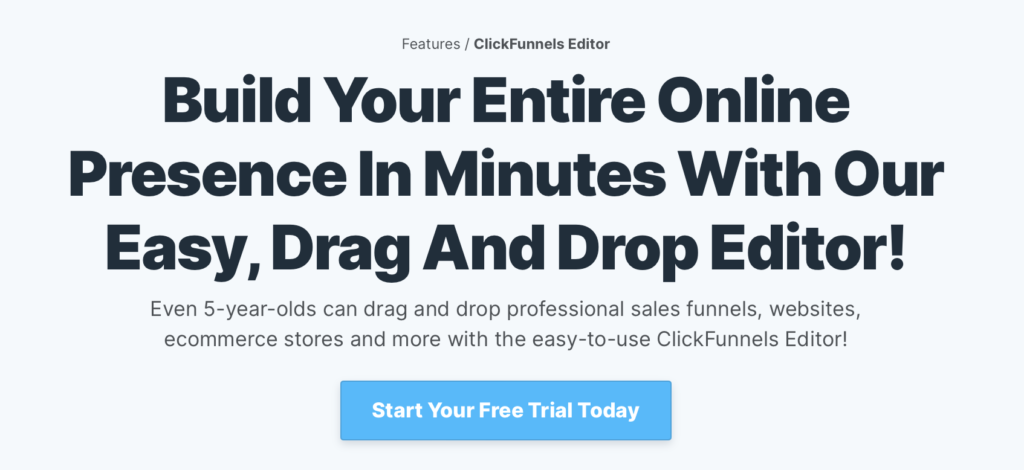
- Drag-and-Drop Builder: Enables quick and easy funnel creation.
- Wide Template Selection: Provides a variety of options to begin with.
- Intuitive User Guidance: Offers helpful resources for easy learning.
- Effortless Payment Integration: Simplifies the addition of payment methods.
Ending on ClickFunnels, we see a platform that’s not just about ease of use but about maximizing the potential of each step in the sales process. It’s tailored for those who want to turn visitors into leads and leads into customers, without the need for extensive technical knowledge.
Shopify: Intuitive E-commerce Platform
Shopify is praised for its user-friendly approach to building and managing online stores, making it a favorite among entrepreneurs who are serious about e-commerce. Its platform is built with the user in mind, ensuring that from product upload to final sale, the process is smooth and intuitive.
- Streamlined Store Setup: Shopify provides a smooth setup experience for users of all technical backgrounds.
- Intuitive Design Customization: A visual website builder and customizable themes make it easy to design a store.
- Comprehensive Dashboard: Managing products, orders, and customer information is straightforward with Shopify’s organized dashboard.
To wrap up on Shopify, it’s clear that the platform is designed to empower business owners with the tools they need to manage an e-commerce operation from end to end. It’s about providing a comprehensive system that’s as accessible to beginners as it is scalable for growing businesses.
Direct Comparison
In the direct comparison of ClickFunnels vs Shopify, it’s clear that ClickFunnels specializes in user-friendliness for entrepreneurs who want to quickly build and optimize sales funnels. Shopify, however, offers an easy-to-use platform but with a broader spectrum of e-commerce tools, catering to business owners who want to create a comprehensive online store with extensive features. While ClickFunnels streamlines the funnel-building process, Shopify provides a more expansive set of tools for managing a full-scale e-commerce operation. Each excels in its domain, providing a tailored experience to suit different business needs.
Conclusion
In the comparison of ClickFunnels vs Shopify regarding ease of use, ClickFunnels is the go-to for creating efficient, high-converting sales funnels swiftly, with user-friendly tools that simplify the process. Conversely, Shopify emerges as the comprehensive platform for entrepreneurs who are building extensive online stores with a need for detailed customization and management features. Your decision between ClickFunnels vs Shopify should be guided by whether you prioritize streamlined funnel creation or a robust e-commerce storefront.
Customization: ClickFunnels vs Shopify
Customization is at the heart of branding and personalization for any online business. When we dive into ClickFunnels vs Shopify, we see two different approaches to customization that cater to varying business needs and styles.
ClickFunnels: Tailoring Your Funnel Experience
ClickFunnels champions customization in the funnel-building space, providing tools that allow for a high degree of personal touch. It caters to those who want to create a unique user journey, making each funnel a branded experience that stands out in the digital landscape.
- Flexible Page Designs: Modify funnel pages to fit your brand.
- Interactive Elements: Add quizzes and pop-ups for engagement.
- Custom Domains: Personalize your funnel’s URL for brand consistency.
- Membership Areas: Create customized membership sections for your audience.
Concluding on ClickFunnels, the platform allows for significant customization within the funnel framework, giving users the ability to create a unique and personalized funnel experience that resonates with their target audience.
Shopify: Comprehensive Website Creator
Shopify stands as a beacon of customization in the e-commerce world, offering a deep level of control over your online store’s look and functionality. It empowers merchants to tailor every aspect, from the storefront to the checkout, ensuring that every element resonates with their brand identity.

- Theme Library: Choose from a vast collection of professional themes.
- Detailed Customization: Edit layouts, colors, fonts, and more.
- App Integrations: Extend functionality with custom apps.
- Custom Code: Add your code for deep customization.
In summary, Shopify provides a comprehensive set of customization tools that enable users to build a fully personalized online store, making it an excellent option for those who prioritize brand identity and customer experience.
Direct Comparison
When comparing customization in ClickFunnels vs Shopify, ClickFunnels is the platform of choice for creating custom sales funnels that are both effective and brand-aligned. Shopify, however, stands out for its extensive customization capabilities for building a unique online store that can grow with your business. Both platforms offer robust options, but Shopify offers a broader scope for customization due to its e-commerce-centric nature.
Conclusion
If funnel customization that aligns with your marketing strategy is what you need, ClickFunnels will serve you well. For those who need a scalable e-commerce platform with extensive customization options, Shopify is the superior choice. Your selection between ClickFunnels vs Shopify should depend on the depth of customization you require for your online business’s branding and customer engagement strategies.
E-commerce Features: ClickFunnels vs Shopify
In the realm of online business, e-commerce features are the bedrock of functionality. Analyzing ClickFunnels vs Shopify on this front unveils distinct approaches tailored to different business needs, reflecting their unique strengths in the e-commerce space.
ClickFunnels: E-commerce Made Simple
ClickFunnels streamlines the e-commerce process, focusing on features that directly support sales through funnels.

- Product Pages: Craft targeted product pages with ease.
- Checkout Simplicity: Simplify the customer checkout journey.
- Payment Integrations: Seamlessly accept payments from multiple gateways.
- Order Fulfillment: Basic features to track and manage orders.
- Upsells and Downsells: The platform makes it easy to add one-click upsells and downsells, increasing the average order value per customer.
Shopify: A Full-Service E-commerce Platform
Shopify stands at the forefront of e-commerce platforms, boasting an extensive suite of features.
- Product Variety: Host a diverse range of products with detailed categorizations.
- Shopping Cart Customization: Tailor the shopping cart for customer upsells.
- Diverse Payment Options: Wide selection of payment methods for global sales.
- Advanced Order Management: In-depth tools for processing and tracking orders.
Shopify is an all-in-one solution for businesses that need comprehensive e-commerce functionality to manage and grow their online store.
Direct Comparison
In the ClickFunnels vs Shopify discussion on e-commerce features, ClickFunnels is praised for its targeted, funnel-specific e-commerce capabilities, ideal for direct sales and marketing campaigns. Shopify, in contrast, offers a comprehensive e-commerce infrastructure, supporting a wide array of retail activities from inventory management to complex customer interactions. For those deciding between the two, consider if your focus is on streamlined funnel sales or building a detailed online retail presence.
Conclusion
For businesses focused on quick, efficient funnel-based sales, ClickFunnels is the platform of choice. However, if your goal is to build a scalable online store with a wide range of e-commerce features, Shopify offers the tools and flexibility needed for success. Your choice in the ClickFunnels vs Shopify debate should be informed by the complexity and scale of your e-commerce requirements.
Sales Funnel Functionality: ClickFunnels vs Shopify
Sales funnel functionality is a vital component in the ClickFunnels vs Shopify debate, as it determines how effectively a platform can guide potential customers from initial interest to the final sale. This capability is essential for businesses that depend on online sales conversions and require a reliable system to manage their customer journey through various stages of the marketing and sales process. Understanding the nuances of how ClickFunnels and Shopify handle sales funnel functionality can significantly impact the efficiency and success of your online business operations.
ClickFunnels: Mastering the Art of the Funnel
ClickFunnels excels in sales funnel functionality, offering a suite of tools designed to maximize the effectiveness of each stage in the sales process.
- Funnel Templates: Numerous templates tailored to various sales strategies.
- A/B Testing: Tools to test and optimize each step of the funnel.
- Conversion Tracking: In-depth analytics to track user behavior and conversions.
- Email Automation: Integrated email sequences that nurture leads along the funnel.
ClickFunnels is the specialist in creating a smooth, efficient funnel that expertly guides potential customers from awareness to purchase.
Shopify: Sales Funnel Features Within an E-commerce Framework
Shopify provides essential sales funnel features within its e-commerce platform, allowing for seamless integration with store functionality.
- Product Discovery: Features that help customers find products easily.
- Add-to-Cart Optimization: Tools to reduce cart abandonment and increase conversions.
- Checkout Upsells: Options to encourage additional purchases at checkout.
- Retargeting Capabilities: Functions to re-engage customers who have left the site.
While Shopify is not primarily a sales funnel builder, it offers sufficient features for merchants to implement a basic sales funnel strategy.
Direct Comparison
ClickFunnels outshines with dedicated tools for crafting a sales funnel, making it the superior choice for businesses that rely on lead conversion. Shopify, while primarily an e-commerce platform, still incorporates basic funnel elements, suitable for those who prefer an all-in-one solution.
Conclusion
For businesses that need a focused, funnel-driven approach to sales, ClickFunnels is unrivaled in its functionality. Shopify, with its integrated sales features, suits those who need a broader e-commerce platform with sales funnel capabilities. Your choice between ClickFunnels vs Shopify should be based on whether your primary goal is to create dedicated funnels or to run a comprehensive online store with embedded sales funnel features.
Marketing Tools: ClickFunnels vs Shopify
Marketing tools play a pivotal role in the ClickFunnels vs Shopify debate, as they are essential for attracting, engaging, and converting customers. Each platform brings distinct capabilities to the table, shaping the way online businesses approach their marketing efforts and measure success. Understanding the strengths of ClickFunnels’ and Shopify’s marketing capabilities is critical for any business looking to establish a solid online presence.
ClickFunnels: Optimized for Conversion
ClickFunnels is tailored for businesses that prioritize direct and efficient customer conversions through targeted campaigns. Its marketing tools are focused on maximizing the performance of sales funnels, with an array of features that optimize each phase from lead capture to final sales.

- Built-in Email Marketing: ClickFunnels offers integrated email marketing tools, allowing users to automate follow-up sequences and maintain engagement with their leads.
- Affiliate Programs: Easily integrate with affiliate marketing to boost sales.
- Social Media Integration: Share your funnels on social platforms.
- Analytics and Reporting: Gain insights into funnel performance to tweak campaigns.
- Limited SEO Tools: While ClickFunnels allows for basic SEO optimizations like editing meta titles and descriptions, its focus is more on funnel conversion than organic search visibility.
ClickFunnels’ marketing tools are laser-focused on funnel optimization, enabling businesses to capture leads, drive conversions, and maximize each interaction along the customer’s journey. Its suite of tools is particularly powerful for targeted campaigns that move leads swiftly through the sales process.
Shopify: Built for Branding and Reach
Shopify’s marketing tools are crafted to support a wide-ranging marketing approach, ideal for businesses looking to strengthen their brand and extend their market reach. The platform offers a robust set of tools that cater to various aspects of digital marketing, from search engine optimization to social media engagement.

- SEO-Friendly Platform: Shopify has strong built-in SEO features, including customizable headlines, titles, and meta tags, making it easier for stores to rank in search engine results.
- Integrated Blogging Platform: The ability to add a blog to your store enhances content marketing efforts and helps in organic search visibility.
- App Store for Marketing Tools: Shopify’s extensive app store includes numerous marketing apps, allowing for enhanced email marketing, social media integration, and much more.
- Social Media Selling: Sell directly through social media platforms.
- Email Marketing: Built-in tools to create and manage campaigns.
- Discounts and Coupons: Attract customers with promotions.
Direct Comparison
In the direct comparison of marketing tools between ClickFunnels and Shopify, ClickFunnels offers an array of features specifically optimized for lead conversion and sales funnel success. It excels in targeted marketing strategies that drive user action within the funnels. Shopify, by contrast, provides a broad spectrum of marketing tools that support a wide-reaching approach, including SEO, social media integration, and email marketing campaigns aimed at building brand presence and enhancing customer loyalty. Each platform caters to different marketing needs, with ClickFunnels focusing on funnel conversion and Shopify on overall brand growth and customer engagement.
Conclusion
Your decision between ClickFunnels vs Shopify should align with your marketing strategy and how you plan to attract and convert your audience. For businesses focused on creating efficient sales funnels with strong marketing automation, ClickFunnels is the ideal choice. However, if you need a platform that supports a broader range of SEO and marketing tools to drive organic traffic and enhance brand visibility, Shopify is the superior option. Both platforms provide valuable marketing capabilities, but their strengths cater to different aspects of online selling and audience engagement.
Third-Party Integrations: ClickFunnels vs Shopify
The capability to integrate with third-party applications is a key factor in the ClickFunnels vs Shopify comparison. This functionality enriches the user experience and expands the potential of each platform, offering businesses additional tools to enhance their online operations.
ClickFunnels: Focused Integrations for Enhanced Funnels
ClickFunnels specializes in integrations that directly complement its sales funnel capabilities, emphasizing tools that streamline the funnel creation and management process. These integrations are chosen to maximize the efficiency of lead conversion and customer journey within the funnels.

- CRM Integration: Connects with popular CRM tools.
- Email Marketing Services: Seamlessly works with top email platforms.
- Webinar Platforms: Integrates with webinar hosting services.
- Payment Processors: Supports various payment gateways.
ClickFunnels’ integrations are meticulously selected to bolster the efficiency of the sales funnel process, ensuring seamless functionality and enhanced user experience. These integrations enhance the platform’s core strength in funnel optimization, offering users tools for more effective marketing, lead management, and customer conversion.
Shopify: Wide Array of Integrations for E-commerce
Shopify’s extensive integration capabilities are designed to cater to every aspect of e-commerce management. From marketing to inventory, its broad range of third-party integrations provides users with the flexibility to tailor their online store to their specific needs and preferences.

- Diverse App Store: Offers a wide range of apps for marketing, SEO, product management, customer service, and more.
- Marketing Tools: Connects with various marketing platforms, such as MailChimp, ONE, Vitals, and many more.
- Inventory Management Systems: Integrates with inventory tracking tools.
- Customer Support Solutions: Offers links to customer service apps.
- Shipping and Fulfillment Services: Seamlessly integrates with shipping providers.
Direct Comparison
In the direct comparison of ClickFunnels vs Shopify when it comes to third-party integrations, ClickFunnels offers specialized tools that enhance its funnel-centric approach, focusing on marketing, sales, and customer engagement. Shopify, however, provides a broader spectrum of integrations, supporting a wide range of e-commerce functionalities from inventory management to comprehensive marketing strategies. This makes Shopify a more versatile option for businesses that require extensive e-commerce capabilities.
Conclusion
The choice between ClickFunnels vs Shopify for third-party integrations and plugins depends on your specific business needs. If your priority is to have a streamlined set of integrations that complement a sales funnel, ClickFunnels is the way to go. However, if you require a wide range of plugins for a diverse set of e-commerce functionalities, Shopify offers a more versatile and comprehensive solution. Both platforms offer robust integration options, but they cater to different aspects of online business management and growth.
Customer Support and Resources: ClickFunnels vs Shopify
Effective customer support and accessible resources are crucial for navigating any e-commerce platform successfully. In the matchup of ClickFunnels vs Shopify, let’s evaluate how each platform supports its users through customer service and educational materials.
ClickFunnels: Comprehensive Support for Funnel Builders
ClickFunnels offers a range of support options tailored to its users’ needs:

- Responsive Customer Support: Users can access customer service through email, live chat, and a ticket system, ensuring assistance is readily available.
- Extensive Knowledge Base: ClickFunnels provides a comprehensive library of articles, guides, and FAQs to help users troubleshoot and learn.
- Community and Training: The platform boasts a vibrant community and offers additional training resources like webinars and the ClickFunnels Academy.
Shopify: In-Depth Support for Store Owners
Shopify excels in providing extensive support and resources to its users:

- Community Forums and Shopify Academy: Users have access to a large community forum for peer support and can take advantage of the Shopify Academy for in-depth e-commerce training.
- 24/7 Customer Support: Shopify offers round-the-clock support via email, live chat, and phone, catering to a global user base.
- Detailed Help Center: A vast repository of documentation, user guides, and tutorials are available for self-help.
Direct Comparison
In terms of customer support and resources, both ClickFunnels vs Shopify understand the importance of robust support systems. ClickFunnels focuses on funnel-specific support and education, while Shopify provides a wide range of support options and learning materials suitable for all aspects of running an online store.
Conclusion
Deciding between ClickFunnels vs Shopify for customer support and resources should be based on your specific needs. If you are looking for targeted support and educational content focused on sales funnels and conversion optimization, ClickFunnels is well-equipped to meet those needs. On the other hand, if you need comprehensive support for a broader range of e-commerce activities, Shopify’s extensive customer service and educational resources are more suitable. Both platforms offer strong support systems, ensuring that users have the help they need to successfully manage and grow their online businesses.
Pricing and Value for Money: ClickFunnels vs Shopify
When assessing the pricing and value for money of ClickFunnels vs Shopify, it’s important to consider not just the cost, but what you’re getting for your investment. Let’s break down the pricing structures of both platforms.
ClickFunnels: Tailored to Funnel Building
ClickFunnels offers a tiered pricing model designed to accommodate the needs of businesses at different stages:

- Basic Plan: At $127 per month when billed annually, this plan includes 20 funnels, three users, and one domain, suited for individuals or small businesses just starting with funnels.
- Pro Plan: For businesses ready to scale, the Pro plan at $157 per month annually provides 100 funnels, five users, and three domains.
- Funnel Hacker: The most extensive plan, at $208 per month annually, offers unlimited funnels, 15 users, and nine domains, catering to large businesses with high funnel usage.
Each ClickFunnels plan comes with a free 14-day trial, allowing businesses to test the platform’s capabilities. Take advantage of the Free Trial by clicking here.
Shopify: E-commerce Platform Pricing
Shopify’s pricing is structured to cater to businesses ranging from small startups to large enterprises:

- Basic: The Basic plan is $29 per month, providing all the essentials needed to start a new online store, including two staff accounts and up to four inventory locations.
- Shopify: At $79 per month, this plan includes professional reports, five staff accounts, and up to five inventory locations, aimed at growing businesses.
- Advanced: For $299 per month, large businesses can benefit from advanced features like 15 staff accounts and up to eight inventory locations.
Shopify also offers a three-month trial for $1, giving users substantial time to explore the platform. Check them out by clicking here.
Direct Comparison
In comparing ClickFunnels vs Shopify for pricing and value for money, ClickFunnels is more focused on providing a range of funnel-building tools and resources, whereas Shopify emphasizes the full spectrum of e-commerce capabilities. ClickFunnels may represent a higher upfront cost but includes more specialized funnel tools. Shopify, with its scalable plans, provides a comprehensive e-commerce solution that can grow with your business.
Conclusion
Choosing between ClickFunnels vs Shopify on pricing and value for money should align with your business objectives and growth trajectory. For businesses centered around detailed funnel campaigns, ClickFunnels’ pricing is justified by its extensive funnel-building and marketing features. On the other hand, Shopify offers competitive pricing for a full-featured e-commerce platform, making it an attractive option for businesses focused on building a scalable online store. Both platforms offer trial periods, which are a great opportunity to gauge which platform provides the best value for your specific business needs.
Conclusion: ClickFunnels vs Shopify – Which Platform Suits Your Business?
In concluding our in-depth comparison of ClickFunnels vs Shopify, it’s evident that both platforms offer robust capabilities tailored to their specific domains within the e-commerce and online marketing landscape. The choice between the two should be informed by your business model, sales strategy, and long-term goals.
ClickFunnels: Best for Funnel-Centric Businesses
ClickFunnels is the platform of choice for businesses that are focused on creating optimized sales funnels. It’s particularly suited for marketers and entrepreneurs who are looking to construct a seamless path that leads the customer from initial awareness to the final sale.
Shopify: Ideal for E-commerce Storefronts
Shopify emerges as the superior option for businesses seeking to establish a comprehensive online store. With its vast array of e-commerce features, it is designed for those who need an all-encompassing retail platform capable of scaling with their growth.
Final Recommendations
- Select ClickFunnels if your primary goal is to build targeted, high-conversion sales funnels with a suite of marketing tools designed for sales maximization.
- Choose Shopify if you are aiming to create a full-fledged online store with a wide range of products, requiring extensive e-commerce features and the ability to scale.
Your decision between ClickFunnels vs Shopify should ultimately hinge on which platform aligns best with the specific needs and aspirations of your business. Both platforms offer the tools and support necessary to build a successful online presence, but they cater to different types of online strategies and business owners. As the digital landscape continues to evolve, both ClickFunnels and Shopify stand as formidable allies to entrepreneurs and businesses looking to capitalize on online opportunities.
If you found this article helpful, feel free to check out our other articles such as “Shopify vs Amazon,” “Unbounce vs ClickFunnels,” “ClickFunnels vs WordPress,” “SamCart vs ClickFunnels,” or any of the articles listed below.


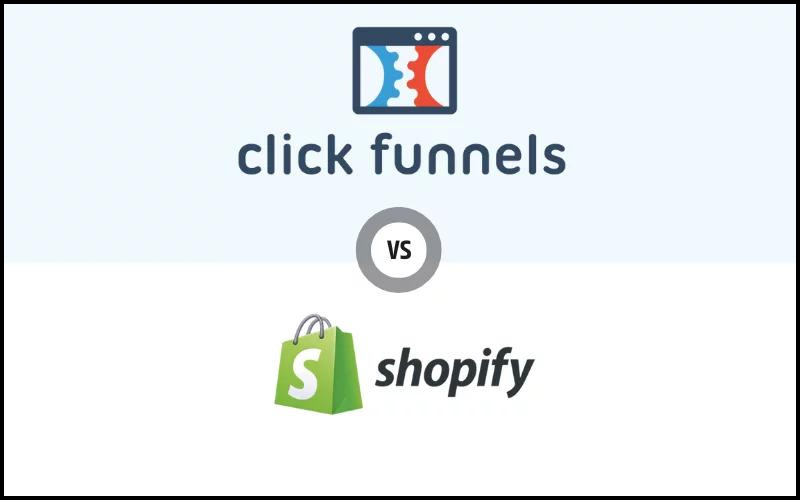
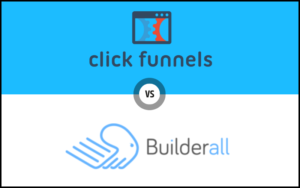
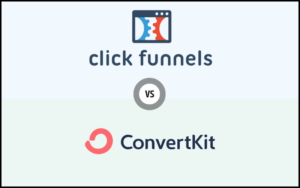
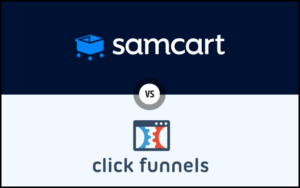
Pingback: Kajabi vs ClickFunnels 2024 - Which is the Best Platform
Pingback: SamCart vs ClickFunnels 2024 - Which is the Best Platform - The Insight Corridor
Pingback: ClickFunnels vs ConvertKit - Elevate Your Marketing Strategy in 2024 - The Insight Corridor
Pingback: ActiveCampaign vs ClickFunnels: Which Is The Best Platform In 2024? - The Insight Corridor